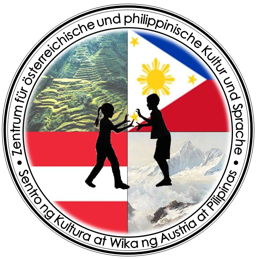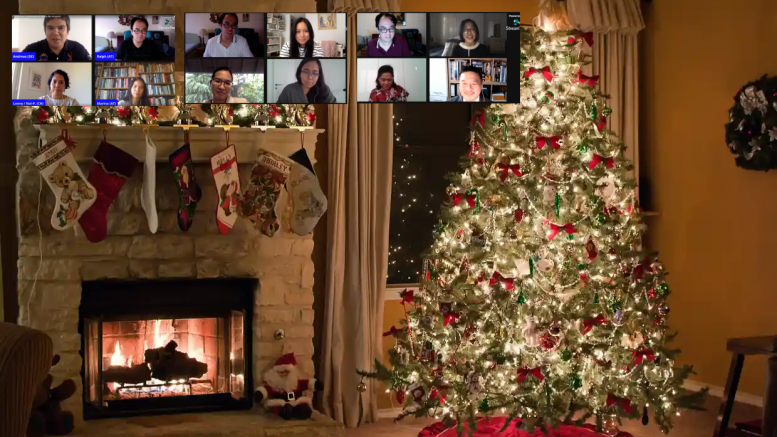Happy New Year! 2020 was a very tough year for all of us. A year full of fear, uncertainty and an ongoing pandemic. Nevertheless, we Sentro, have not been idle and have entered a new platform in the digital world. We have started our own webinar series called „Euro-Pinoy Talk“.
If you haven’t seen them yet, here are the links:
1st episode in German about Filipino identity with participants from Austria, Germany and Switzerland: https://www.zentrum-oep.at/?p=1083
2nd episode in English about Filipino PhDs in Europe (Austria, Germany, Sweden): https://www.zentrum-oep.at/?p=1075
3rd episode in English with the title ”Speaking-Teaching-Learning Tagalog“ with Tagalog teachers from across Europe (Germany, Italy, UK): https://www.zentrum-oep.at/?p=1109
It was an interesting experience not only for us as organizers, but also for our participants and partners. To all involved thank you very much for your participation. You were an asset to the webinars.
Stay curious and talk about it. The next webinar is just around the corner.
All the best, Ralph Chan (Host of Euro-Pinoy Talk)
Here are some statements:
„Vielen Dank nochmals für die Einladung zum ersten Webinar! Es hat mich gefreut, die Teilnehmenden kennen zu lernen und mich mit euch über unser Dasein als Europin@ys auszutauschen, besonders über die Ländergrenzen hinweg. Im deutschsprachigen Kontext ist der Diskurs ja noch ausbaufähig, es würde mich also sehr freuen, wenn der Dialog weitergeführt wird und mehr Gesichter aus der Schweiz vertreten sein können. Ich merke, es gibt doch auch einige Nuancen, die unsere Umstände in der Schweiz von denen in Deutschland und Österreich unterscheiden, aber auch viele Gemeinsamkeiten – wie man bereits am Beispiel unserer Sprache(n) schön erkennen kann. Vielen Dank für die Initiative und weiterhin viel Erfolg für weitere gemeinsame Projekte!“
(Lenny Bugayong, Teilnehmerin der ersten Episode “Filipino Identität“)
„I was very pleased to be asked to participate in the webinar re Teaching Tagalog. I believe that this is a very important topic as we enter the age of Global Pilipino as a language. Tagalog/Pilipino continues to be significant and although back home there is less interest in our national language, it is very heartwarming to see that globally it is gaining presence. Modern Tagalog/Pilipino is a beautiful language and the challenges of teaching it is an important and essential subject which indeed must be addressed and talked about. I am very grateful to the organisers of the webinar for this opportunity. It was well presented and it is obvious that a lot of thought and care went into the planning. I hope we can continue the conversation in the new year. All the best.“
(Anna-Luisa “Luigi” Crespo, Participant of the third episode “Speaking-Teaching-Learning Tagalog”)
“Doing a podcast on the experience of pinoy PhDs was a very good idea, because it is one of the questions I get most often from other Filipinos: how did I get to study in Germany. The podcast gave us here a platform to share valuable insight into the life and struggles of studying in Europe as a Filipino. Many aspiring students probably only think about the first part of the whole experience: applications and getting in, getting a scholarship, getting a visa, etc. I believe our discussions provided a much needed depth into the many other cultural and emotional challenges that are crucial for making that decision to study abroad. And there is also a little bit of pride in knowing that maybe at least one person watching the episode will be encouraged to pursue a PhD in Europe.”
(Vigile Marie Fabella, Participant of the second episode “Filipino PhDs in Europe”)
“I was happy to join the Pinoy PhDs webinar and I was even happier with the feedback that it was really helpful to some of those who watched. It was time well volunteered and I hope that those who are interested in taking up graduate studies in Europe would be successful. If anything, they can always reach out to us to ask for help. I will be happy to do so!“
(Denise Margaret Matias, Participant of the second episode “Filipino PhDs in Europe”)
“After attending the Euro-Pinoy talk webinar on Filipino PhDs in Europe, it only further confirmed my impression that more and more Filipino scholars are considering pursuing higher education outside the Philippines. There is a growing interest in European universities and there is plenty of information online about scholarships, programs, and universities that students can apply to. However, the questions we received during the webinar showed that these types of events are still helpful to have a more dynamic and detailed discussion on the realities of pursuing higher education in Europe – anything from the struggle of navigating the application process, adjusting to new cultural environments, funding concerns, and so on. Webinars that connect Filipino students abroad and in the homeland can also encourage the development of academic and professional networks, and knowledge exchange in general.”
(Karla Paredes, Participant of the second episode “Filipino PhDs in Europe”)
„Nachdem ich hier in Deutschland von anderen asiatisch-deutschen Podcasts gehört hatte, kam mir die Idee zu dem ersten Podcastthema Identität der Euro-Pin@ys Second Generation. Ich war sehr froh darüber, dass Ralph Chan als Repräsentant vom Sentro diese Idee aufgenommen hat, um daraus eine Podcastserie zu entwickeln. Unser erster Podcasttalk war wirklich eine Premiere mit Vertreter*innen der zweiten Generation aus dem deutschsprachigen Raum. Das Gespräch hat gezeigt, dass wir uns als Second Generation mit ganz anderen Themen beschäftigen als die erste Generation der eingewanderten Filipinos nach Deutschland, Österreich und in die Schweiz. Ich hoffe, dass dieses Gespräch zur Sichtbarkeit der Euro-Pin@y Generation beiträgt. Bisher wird ja unsere Generation kaum wahrgenommen, obwohl wir als Brückenbauer zwischen Europa und den Philippinen sicherlich eine wichtige Rolle einnehmen. Vielen Dank auch an Lenny, Marina und Ralph, dass sie so offen über ihre persönlichen Erfahrungen berichtet haben. Ich bin gespannt auf weitere Podcast Folgen vom Sentro!“
(Andreas Schmitz, Teilnehmer der ersten Episode “Filipino Identität“)
Die „Euro-Pinoy Talk“-Webinare sind als länderübergreifendes Format einzigartig und geben gute Einblicke in unterschiedliche Lebenswelten von Filipin@s in Europa. Für mich als Teilnehmerin in der ersten Episode war es sehr spannend zu hören, wie es anderen „Halb-Filipn@s“ wie mir geht, wie sie ihre Idenität begreifen und welches Verhältnis sie sowohl zu den Philippinen als auch zu Europa haben. Die Gespräche bieten damit gute Möglichkeiten zum Austausch und zur Vernetzung.“
(Marina Wetzlmaier, Teilnehmerin der ersten Episode “Filipino Identität“)
“I’ve been teaching Tagalog to adults for about 20 years in Hamburg – first with the support of a local Filipino association and in the last fifteen years, in partnership with the Southeast Asian department of the Asian African Institute of the University of Hamburg. Although we were able to continually find enough participants to keep the courses going, the community is quite small and keeping courses going was not that easy.
Finding other Tagalog teachers in Europe was even more difficult. So finally getting to know the others through the Euro-Pinoy Talk webinar series was so rewarding. Talking about Tagalog and our common experiences in teaching our wonderfully complex and rich language made the time pass rapidly and I am sure that we could have gone on much longer. I can only hope that this has hopefully been as interesting to the listeners as it was to us and that this would further increase interest in and appreciation of our wonderfully diverse languages and our rich Filipino culture and heritage.
I, for one, am very optimistic as well as very grateful to the Sentro ng Kultura at Wika ng Austria at Pilipinas that they are playing such an important role in this. Keep on keeping on!”
Vincent Wongaihaim-Petersen, Participant of the third episode “Speaking-Teaching-Learning Tagalog”)
“It was our pleasure to get to know you and your organization and being involved in one of your Euro-Pinoy talks. The topic was of interest and talk was alive, very interactive, with interesting exchanges and insights.”
(The Philippine Italian Association, Partner organization of the third episode “Speaking-Teaching-Learning Tagalog”)

